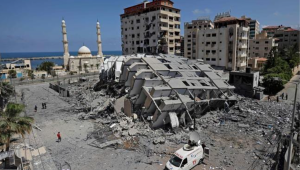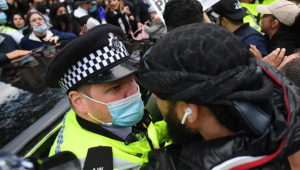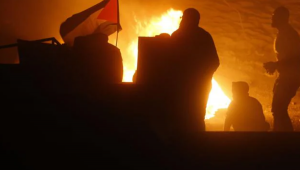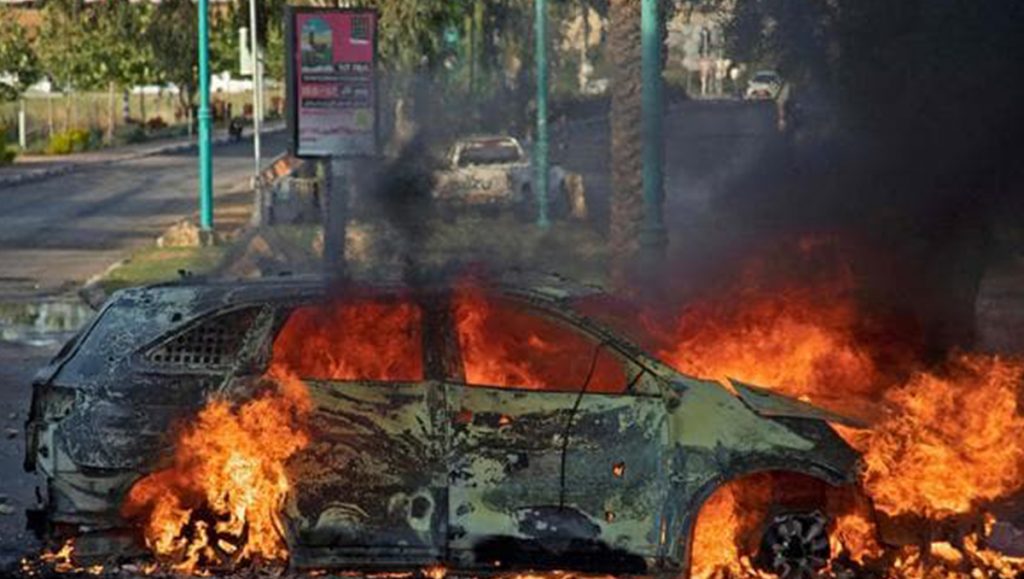At least 55 people are dead and there are fears of a “full scale war” after the simmering conflict between Israel and Palestine hit worrying new levels.
Relentless rocket fire and rioting in mixed Jewish-Arab towns continues to fuel growing fears that violence between Israel and Palestine could devolve into a “full-scale war”.
The conflict has already claimed 55 lives, including 14 children, in the most intense hostilities between the two in seven years.
Palestinian militants have launched more than 1000 rockets since Monday and Israel’s army is also responsible for hundreds of air strikes on Hamas and other Islamist groups in the crowded coastal enclave of Gaza.
The hostility kicked off after unrest at Jerusalem’s Al-Aqsa mosque compound, which is sacred to both Muslims and Jews.

Nations around the world have expressed growing alarm about the conflict and protests have sprung up in Africa, Europe and the US. Large demonstrations were held in solidarity with Palestinians around the world, including in London, as well as in Muslim-majority countries including Kuwait, Lebanon, Oman, Pakistan, Tunisia and Turkey.
The UN Security Council has also held another emergency meeting on the bloody crisis, as the UN Middle East envoy Tor Wennesland warned that “we’re escalating towards a full-scale war”.
Israeli Prime Minister Benjamin Netanyahu declared a state of emergency in the mixed Jewish-Arab Israeli city of Lod, where police said “wide-scale riots erupted among some of the Arab residents”.
There were fears of widening civil unrest as protesters waving Palestinian flags burnt cars and properties, clashed with Israeli police and attacked Jewish motorists in several Jewish-Arab towns across Israel.

Palestinian groups Hamas and Islamic Jihad have launched more than 1000 rockets, Israel’s army said, including hundreds at Tel Aviv, where air sirens wailed overnight.
Of these, 850 rockets have hit in Israel or been intercepted by Israel’s Iron Dome air defence system, while the rest have crashed inside Gaza, the army said.
Israel has launched hundreds of air strikes at Gaza, the Israeli-blockaded strip of two million people that Hamas controls, targeting what the army described as Palestinian military sites.
At least 230 Palestinians have been wounded, many rescued from the smouldering ruins of buildings.
On the Israeli side, more than 100 people have been injured, as residents across the Jewish state have been ordered to seek shelter.
British Prime Minister Boris Johnson urged both sides to “step back from the brink” and to “show restraint”.
Israeli Defence Minister Benny Gantz warned that “this is just the beginning” of Israel’s strikes, vowing that the operation, now dubbed “Guardian of the Walls”, would aim to restore peace “for the long-term”.
Hamas leader Ismail Haniyeh threatened to step up its operation code-named “Sword of Jerusalem”, warning that “if Israel wants to escalate, we are ready for it”.
Despite Israel vowing to restore peace, the nation’s army spokesman, Jonathan Conricus, said he was expecting the fighting to intensify and, when asked about unconfirmed reports that Hamas might seek a ceasefire, said: “I don’t think my commanders are aware, or particularly interested.”

The crisis started last Friday when weeks of tensions boiled over and Israeli riot police clashed with crowds of Palestinians at Jerusalem’s Al-Aqsa mosque, on the last Friday of the Muslim holy month of Ramadan.
Nightly clashes since then have rocked the ancient compound and flared elsewhere in east Jerusalem, leaving more than 900 Palestinians injured, according to the Palestinian Red Crescent.
The unrest has been driven by anger over the looming evictions of Palestinian families from the Jerusalem neighbourhood of Sheikh Jarrah.
Adnan, a Palestinian from east Jerusalem, told AFP that rubber bullets fired by Israeli police would not deter him.
East Jerusalem, the majority Palestinian part of the city annexed by Israel in 1967, has been hit by some of its worst unrest in years.
For 20 year-old Adnan, who like many Palestinians in east Jerusalem refused to give his name for fear of Israeli police retribution, protesters are responding to what he said was as a persistent effort by Jewish settlers to expel them from the city.
“We are here, in the street, to say that we are not going leave,” he told AFP. “For years, settlers have attacked us and taken our land but silence is no longer an option.”
SOURCE: News.com.au

